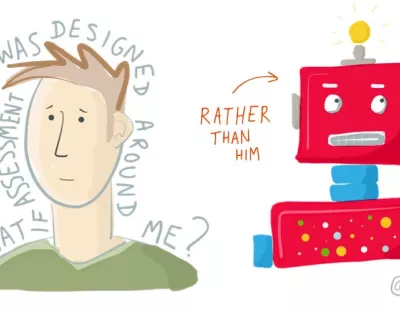By Angelica Risquez.
Reading time: ~2 minutes.
Featured Image Source: ‘Thief’ by Nina Paley
Welcome! My name is Angelica Risquez and I am a Lead Educational Developer at the Centre for Transformative Learning. The sudden shift to online teaching and learning has raised significant concerns about the academic integrity of ‘take-home’ exams, and indeed, this may be the reason why you are reading this post. As European Academic Integrity Week is coming up, it is timely to give this issue some due consideration. I have researched this area extensively and supported the pedagogical use of Turnitin in UL since 2007, hence this is a topic that is very close to my heart. So, to explore this topic more with you, I will publish 3 connected posts on Monday, Wednesday, and Friday this week.
Today we will look at these 3 questions:
1. Do students cheat more when learning online?
As students are no longer grouped in exam halls for final examinations, where the usual examination rules and monitoring apply, strong suspicions have emerged around the validity and integrity of online alternative assessment methods. The IUA Academic Integrity in Online Assessment recommendations point to research evidence that the medium for assessment (campus based vs online) is not such an influencing factor in academic integrity as one may think. Online students are no more likely to cheat on assessments than when based on campus because the same opportunities exist for cheating on homework, take-home assignments, essays, group-work, etc. So, your students are not suddenly going to start plagiarising on continuous assessment simply because of the move to online learning. However, the exception to this might be in exams, where students are used to being monitored under exam conditions. Students are more likely to cheat when they are under pressure, when they have opportunity and when it is unlikely that there will be consequences, if caught.
2. Why do students do it?
Prof Sarah Moore, in her piece on ‘Plagiarism at College’ (Appendix 3 of the Student Handbook at UL), reminds us of the reasons why some students engage in academically dishonest behaviour. This spans from sheer innocence or accident − due to lack of awareness or skills around proper citing and referencing − all the way to blatant deceit. She highlights that when students are discovered to have engaged in plagiarism, they are often amazed to find that it is an action that is punishable by the university; and that such an attitude is more understandable now than ever before given the ease with which information can be easily transferred and reproduced through electronic means. In other cases, Moore argues that many students who plagiarise do so more out of desperation than wilful dishonesty. They are often under time pressure to get an essay or assignment in, and they feel that they have no other option.
As well as all the reasons for plagiarism that we have explored above, the real problem is that it is paradoxical. After all, we learn by copying […] It can feel as if you are being told to ‘sound like us, write like us, learn to think like us, but whatever you do, don’t copy us.’
- Sarah Moore
3. What can you do as an educator to promote academic integrity?
The IUA Academic Integrity in Online Assessment document includes some concrete suggestions based on materials shared by Dr Tricia Bertram Gallant, Director, Academic Integrity Office, UC San Diego in a webinar recorded on 20 March 2020 titled Going Remote with Integrity.
In part 2 of this post, I will go through their suggestions and will apply them to the UL context and guidelines on assessment (a taster in this webinar if you are too eager to wait!).

